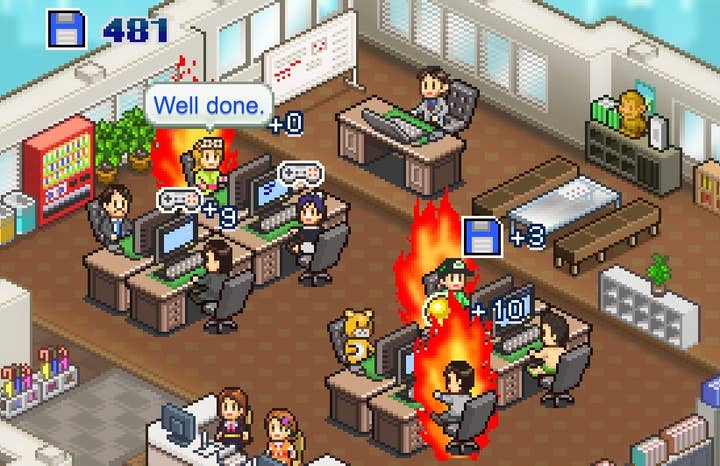Remote work is here to stay -- but it won't be cheap or easy
Square Enix shifting to permanent remote work makes the transition seem inevitable, but it needs to be embraced for the right reasons
This week, Square Enix's Japanese operations announced that the remote working arrangements put into place to cope with COVID-19 are being made permanent. It's unlikely that this will be the last such announcement; many companies around the industry are grappling with the question of what to do regarding remote work, and what the "new normal" after the pandemic will actually look like.
Many employees will be happy to see game companies starting to take this kind of flexible working arrangement seriously. In truth, remote working has been popular with enough staff that it was always going to be extremely hard to go entirely back to the old way of working. The cat's out of the bag; it's clear that the industry's business doesn't entirely fall apart when people work remotely, and thus convincing everyone to go back to their old style of work was never going to fly.
Moreover, having been forced to do so by COVID-19, a lot of companies are actually seeing benefits from certain aspects of remote work. A certain degree of cruft and overhead has been cut out of working practices -- as someone at a major studio told me recently, "after spending years complaining about meetings that could have been emails, we're actually finding out which meetings really do work as emails" -- and while it's too early to make any sweeping pronouncements about productivity yet, it's not terribly controversial to suggest that employees who are happy about getting to spend more time with family and relaxing will also be more focused during working hours as a consequence.
The cat's out of the bag; it's clear that the industry doesn't entirely fall apart when people work remotely
These are good reasons to integrate remote working as a key part of how a studio or publishing business functions -- employee satisfaction and work-life balance, and improvements to process and productivity. Unfortunately, however, there are also bad reasons out there; and as companies try to figure out how to shift gears from remote work being a crisis response to remote work being a long-term change in workplace policy, the reasons underlying that decision-making process are going to be make-or-break for the medium- to long-term viability of those workplaces.
The worst reason is, unfortunately, one that I hear pretty often: cost-saving. Lots of executives -- not just in the games industry but in every other industry you can mention -- are starry-eyed at the prospect of downsizing their office space and staffing overheads by moving to a largely remote working style. Some companies have already begun the process, cutting back on office floor-space and shifting what remains over to a hot-desk environment; the notion being that employees largely work from home and just take an available desk to pop their laptop onto when they come into the office.
There is a pretty wide spectrum of ways to implement things like hot-desking, of course, and some are worse than others -- the worst I've come across thus far was a kind of hot-desking absolutist approach wherein employees didn't even get lockers or small storage spaces in the office and their departments were billed whenever they used a desk -- but the concept could certainly have some limited applications even for game companies.

Again, the problem is motivation. A company that wants to move to hot-desking as a sensible way to use resources to support employees and their projects in a largely remote working environment can probably come up with sensible ways to make it work, even for tricky situations like a game nearing an important milestone. This is likely to see much of that team move temporarily to in-person working, thus annexing a lot of the hot-desk resources and potentially disrupting the work of other teams if there's no plan to handle such a situation. If a company sees hot-desking merely as a way to cut down on the rent and bills for office space, it's setting itself up for failure.
Here's the thing; there's almost certainly no actual cost saving to moving to a remote work paradigm. In fact, if a company is taking this seriously, it should be budgeting a slightly higher per-employee cost for remote workers than for in-office workers, because keeping staff together in an office effectively combines and discounts a lot of costs that will now be distributed across individual staff members.
Oh, what, you thought that employees would just pay for their own broadband, lighting, heating, in-home office space and high-quality office furniture and equipment? Sure, many staff have been doing just that this year, but this year was a crisis -- a one-off, hopefully. If remote work becomes a default way of working, that grace period will quickly expire.
Freelancers get tax deductions to help cover those costs, which they then spread across multiple clients; salaried employees do not, and in many if not most jurisdictions it's likely that the courts will back them to the hilt when they demand that their employer cover their home office costs. As this kind of working rolls out across many industries, we'll also likely start to see legislation being proposed in many countries that forces companies to properly pony up for safe, healthy and suitable work environments for their remote employees -- and I guarantee that's going to work out more costly per-head than a regular office.
If a company sees hot-desking as a way to cut down on the rent and bills for office space, it's setting itself up for failure
That doesn't mean it's not the right thing to do; it just means that it's not going to be a short-cut to cost savings, and it means that planning for remote work needs to be executed from the perspective of productivity and employee satisfaction, not penny-pinching. Moreover, it also needs to take into account thorny questions about workplace culture to which, honestly, no real answers exist just yet.
There has been a tendency as this year has drawn on for some people to get a bit fundamentalist about remote work. Perhaps fearing a return to the old status quo after the pandemic, those who have been enjoying the new arrangement will loudly declaim anyone who questions it. Their enjoyment of the new flexibility -- the ability to spend more time with family, to cut out the commute and ultimately to move out of the city and save costs while still living in a larger home, etc. -- leads them to assume that this must be what everyone desires, to the point that I've heard many people suggesting that the coming decades will see an emptying out of major cities at a grand scale.
I'll make the actually not terribly bold prediction here that COVID-19, for all that it's been disruptive, is not going to reverse thousands of years of gradual urbanisation, much of which rather predated widespread office work. Taking full advantage of the flexibility offered by remote work will appeal to a great many people, but for many others city living is actually a pleasure, rather than an evil to be tolerated for the sake of gainful employment. As companies roll out remote working provisions, a cultural divide between those two groups of employees is going to emerge that's going to need to be handled and managed very closely.
Some staff will stay in close proximity and go to the office often, as much for the social aspects as through necessity for work. Others will take the "remote" aspect of remote working to heart, and appear in the office very infrequently. It will take significant effort and careful management to ensure that those divides don't solidify into cliques -- that remote workers, in particular, don't find themselves locked out of decision making processes and opportunities. Balancing that against the genuine advantage of having people physically working together and bouncing ideas off one another -- essential in many creative processes -- will be a very tough problem to solve.
Ultimately, as companies start this process of integrating remote work as a core part of their practices, it's going to be worth going back to Microsoft CEO Satya Nadella's comments quite early in the pandemic, when he observed (paraphrasing here) that many firms who had switched to remote work were spending social capital they had no way of recharging.
This has held true through experiences related from many companies that have been trying to figure out remote working this year; old employees who have been colleagues for years fare far better than new staff who struggle to establish social relationships with people they only ever see on Zoom. Teams working on long-running projects with well-established goals do pretty well; teams trying to start new projects grind to a halt as the technology for online collaboration slows or entirely stops effective brainstorming. Combine this with the cost aspects -- it won't be cheap, let alone being a saving -- and the trickiness of managing social relationships within a company where some staff are remote and some maintain in-person contact, and you've got a very major challenge ahead for this industry and others like it.
Yet in the end, it will be worth doing -- and it's probably unavoidable, because those staff who have had a taste of how effective remote working can be aren't going to willingly go back to the old paradigm. Remote work will, and must, find a place alongside other styles of work as an established, accepted and well-considered part of how companies function. Those that succeed will be those who approach remote work policies with the right objectives in mind, a sense of flexibility, and a willingness to put in the elbow grease to get these policies and systems to work well for everyone involved.

